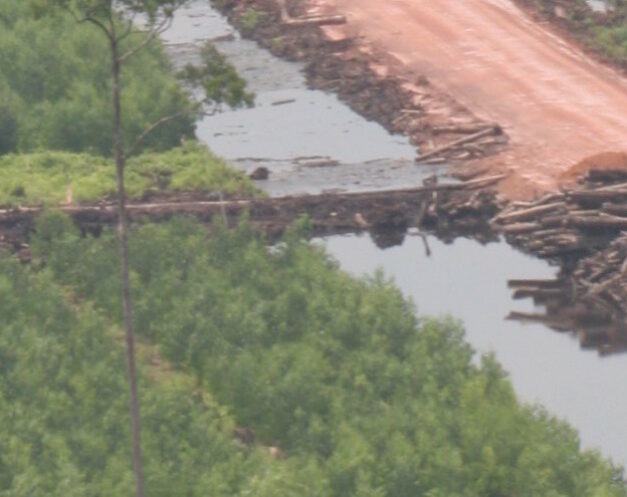Greening the pulp and paper industry

The pulp and paper industry is booming in Southeast Asia. The pulp wood plantations, primarily Acacia crassicarpa, are often grown on carbon rich and biodiversity dense peatlands, in particular in Indonesia. This causes high carbon emissions and loss of tropical forest and wetlands.
Our aim
Wetlands International raises attention for the adverse consequences of the production of pulp on peatlands. We work together with government, industry and civil society towards the sustainable production of pulp wood through best management practices lowering emissions and subsidence, land swaps to highly degraded areas, development of alternative economic land-uses on rewetted peatlands and rehabilitation of degraded peatlands.
Read our recommendations for the industry (companies and investors) and government of Indonesia.
Problems
While pulp wood production on peat seems profitable for companies and their investors in the short term, externalities like high carbon emissions, biodiversity loss and social conflicts are not on the balance sheet of profit calculations. In the medium to long-term fiber supply can be threatened due to peat soil subsidence which can cause flooding, salt water intrusion and productivity loss.
Affected areas
Between 2000 and 2010 pulp plantations on peatlands in Sumatra have increased with 991%. Pulp mills are situated close to peatswamp forests, due to the easy and cheap access to these large stretches of land, providing a huge supply of natural fiber to the mills from the conversion of peatswamp forest to plantation, being located close to the coast for transport and having no or few traditional land right claims.
Pulp production is mainly concentrated in the Sumatran provinces of Riau, Jambi and South Sumatra but also in West- and East Kalimantan. For 2010, at least 50% of pulp produced in Riau came from peat soils.
How are peatlands impacted by pulp wood?
For pulp production on peat, peat soils are drained which causes continues oxidation and degradation. This impacts many peatswamps in Indonesia, in particular in Sumatra and Kalimantan. This happens despite the Moratorium on new forest concessions and conversion of peatlands in Indonesia.
Peat drainage leads to:
- High CO2 emissions due to the oxidation of the carbon rich organic soil. Emissions from peat soils contribute to 60% of the total Indonesian GHG. Continue reading.
- Subsidence of the peat soil, leading to flooding, salt water intrusion and land loss. The majority of Indonesian peatlands have their base below mean sea and river level and are threatened by flooding through peat subsidence and undrainability. Drained tropical peatland areas may subside by 50 cm meter in the first year, 2,5 metres in 50 years and up to 4-5 meters in 100 years.
- Loss of biodiversity (many rare and endemic species).
- The undermining of important livelihood opportunities of current and future generations. The peat conversion causes important ecosystem services to degrade, such as fire prevention, water quality, the provision of livelihoods from fishing and forest products. When subsidence reaches the drainage base, all land uses, including traditional ones, will be lost. The pulp wood industry also provides relatively low labor requirements for local people in comparison with oil palm plantations. Continue reading.
What can we do about it?
- Roadmap for sustainable pulp production: Wetlands International advocates for the development of a roadmap for a sustainable pulp wood sector, and for the conservation, restoration and wise use of peatlands to reduce greenhouse gas emissions, loss of biodiversity, loss of ecosystem services and to prevent further subsidence of peat soils.
- Transparency: It is vital that commitments of no deforestation made by the pulp and paper industry are carefully monitored and verified. Transparency about existing and new concessions and peat management improvements is an absolute necessity to avoid green wash.
- Informed by recent and accurate science: It is also crucial that the pulpwood sector is informed with the most recent and accurate science regarding the GHG emissions, biodiversity and subsidence in peatlands. Wetlands International aims to broker sound peat science produced by its partners towards industry, government and NGOs.
Recommendations:
Read our recommendations for the industry (companies and investors) and government of Indonesia.
Partners and financial support:
Financed by: Climate and Land Use Alliance and NORAD
